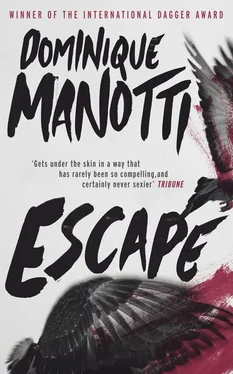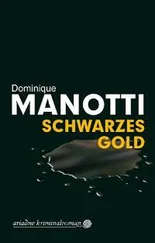Dominique Manotti - Escape
Здесь есть возможность читать онлайн «Dominique Manotti - Escape» весь текст электронной книги совершенно бесплатно (целиком полную версию без сокращений). В некоторых случаях можно слушать аудио, скачать через торрент в формате fb2 и присутствует краткое содержание. Год выпуска: 2014, ISBN: 2014, Издательство: Arcadia Books Limited, Жанр: Криминальный детектив, на английском языке. Описание произведения, (предисловие) а так же отзывы посетителей доступны на портале библиотеки ЛибКат.
- Название:Escape
- Автор:
- Издательство:Arcadia Books Limited
- Жанр:
- Год:2014
- ISBN:9781909807747
- Рейтинг книги:4 / 5. Голосов: 1
-
Избранное:Добавить в избранное
- Отзывы:
-
Ваша оценка:
- 80
- 1
- 2
- 3
- 4
- 5
Escape: краткое содержание, описание и аннотация
Предлагаем к чтению аннотацию, описание, краткое содержание или предисловие (зависит от того, что написал сам автор книги «Escape»). Если вы не нашли необходимую информацию о книге — напишите в комментариях, мы постараемся отыскать её.
Escape — читать онлайн бесплатно полную книгу (весь текст) целиком
Ниже представлен текст книги, разбитый по страницам. Система сохранения места последней прочитанной страницы, позволяет с удобством читать онлайн бесплатно книгу «Escape», без необходимости каждый раз заново искать на чём Вы остановились. Поставьте закладку, и сможете в любой момент перейти на страницу, на которой закончили чтение.
Интервал:
Закладка:
‘OK. Thank you.’
Lisa lies on her back, staring at the ceiling, fully awake now. What should she make of the reaction at the Corriere di Brescia ? First of all, obviously, success. Pier-Luigi’s story is pretty much confirmed. I haven’t got the evidence yet, but I know it exists and where to look for it. And a failure too. With this aborted attempt to get the Corriere di Brescia to run the story, I’ve alerted our enemies, whoever they are, and they now know that we’re on to them and we’re getting closer. They’re going to be able to take precautions. And that’s not going to be good for us. Most likely they’ll eliminate Luciani. Serious? No, not very serious, the guy has already testified. All the papers are talking about it, impossible to erase, that’s all we need. More importantly, no point now trying to publish our story directly in Italy, the media have been muzzled. We’ll have to go via the lawyers and the League of Human Rights, here in France. And therefore through Filippo. Shit .
Lisa gets out of bed and goes into the kitchenette to make a coffee. She paces up and down, half promises herself that she’ll do everything she can to put off the moment when she has to meet him. Roberto will say to her: Because you don’t want to share Carlo. Maybe. So what? I’m entitled to feel that way .
She sits down at her desk. A shadow, a vague memory lurks in her mind, perturbs her, prevents her from considering the job done and closing the file. She goes back over her notes and begins to reread them. Very quickly lights on that little phrase of Stefania’s: the takeover of the Tomasino family bank by the Piemonte-Sardegna bank after the war. She recalls how the name Piemonte-Sardegna had struck her when the young journalist mentioned it. Then they had changed the subject. Was its appearance in a different chapter of the history of the bank involved in the hold-up and Carlo’s death pure coincidence? Maybe, maybe not. Best to start from the principle that there’s no such thing as chance.
3 July
It is Sunday. Lisa is moping around at home, unable to find a new avenue to explore in her investigation. If she were in Milan … the prospects probably wouldn’t be any better.
The Piemonte-Sardegna bank has a Paris address. Rather than staying there doing nothing, why not use the time to go and check out the bank’s Paris headquarters. Imagination works better when it can draw on images, actual places, real people. And besides, a walk through Paris is always enjoyable, it’s a lovely day and at least she’ll have the feeling she’s doing something. She finds herself in the Opéra district, standing in front of a magnificent Haussmann building. A discreet copper plate in the entrance porch indicates that the bank’s offices are on the second floor. Lisa looks up, the piano nobile , a balcony running its length, high ceilings that she imagines covered in frescos. A fine example of nineteenth-century architecture. Of course. The kingdom of Piedmont-Sardinia, Napoleon III, Italian unity, the annexation of Savoy to France — she recalls a whole string of school essays. These offices testify to many strong links that must exist between French and Italian banks. And so … French historians might have taken an interest in this bank, one way or another.
Lisa hurries back home to Rue de Belleville, grabs her address book and seeks out a contact in the academic world.
It doesn’t take her long. She comes across the name of Vicenzo Rivola, very recently arrived in France, close to the Autonomia Operaria movement from which Lisa, as a good ex-Red Brigades member, keeps her distance. But French intellectuals have great respect for this movement, whose manifestos, journals, books and talks are of a reliably high standard. Vicenzo swiftly succeeded in finding some hours’ teaching in the sociology department of a major Paris university. Lisa picks up the phone and easily gets through to him. She explains what she is looking for: any available information on the links between the Piemonte-Sardegna banks and Tomasino after 1945.
‘It’s a bit vague, but I can’t be any more specific. I’m groping in the dark and I don’t know what I’m looking for.’
‘That’s the best way of coming across something new. At my university we have an excellent historian of modern-day banks. A former communist, not too sectarian, an encyclopaedic mind. I don’t know him personally, but I can put you in touch. On the other hand, I warn you, it might take him a while to respond. Academics aren’t journalists — they’re in no hurry.’
Early July
For the last few days, each morning just before six, a man has come and planted himself beneath an awning around fifty metres from the rear façade of the Tour Albassur. He’s a sporty type in his mid-thirties, wearing a grey hoodie with no loud logos on it, jeans and trainers. He stands chain-smoking in the shelter of a low concrete wall, his hood pulled down over his face. He carefully stubs out each cigarette on the sole of his shoe, takes a matchbox out of his pocket, crams the cigarette butt in the box and puts it back in his pocket before lighting another one. He perks up when the Albassur security guards on night shift come out, between 6.05 and 6.10, two men in their fifties, chatting. They head for the Métro entrance, walking placidly, bags slung over their shoulders. He watches them until they disappear, then waits another couple of minutes, checks that there is no one near the approach to the tower before departing in the opposite direction, shoulders hunched, hood pulled well down over his eyes.
On the fifth morning, when the two security guards come out of the building, the man peels himself away from the wall, hurries over and speaks to them.
‘Excuse me, gentlemen…’ The guards stop, wary.
‘…I’m sorry to bother you, and I don’t want to delay you. I’m a friend of Filippo Zuliani’s. I work at La Défense and I was told he works here too. I’m trying to find him…’
‘Too late, mate, he handed in his notice at least a week ago.’
‘And you don’t know…’ The two men have begun to move off, quickening their pace.
‘No, we don’t know anything. Sorry, mate.’
One of them mutters, ‘Dodgy-looking guy!’ as they vanish into the Métro. Next morning the lookout is no longer there.
Filippo has begun writing again, feverishly. In order to replay the aborted date at the Café Pouchkine, obliterate the disaster, conquer Cristina. Her magnificent copper hair is like that of the girl Carlo kissed in the mountains, and Filippo loves this game of mirrors and echoes. He wants her, he convinces himself that he needs her because she’s rich, beautiful and cultured. He still feels like an imposter in the world he has now entered, constantly playing a part, afraid of betraying a lack of taste or of suffering a memory lapse, liable to be thrown out at any moment. With her on his arm, he would be adopted as a member of the family, and so become truly legitimate. Today, because he has grown up since the Café Pouchkine, he has the strength to conquer — he is no longer the same man. Back then, he was still a petty crook, capable of little more than arousing in her a formidable and mortifying protective instinct. Now he is viewed as the accomplice of an almost legendary criminal, Carlo Fedeli. A much more fascinating character. That makes anything possible. Cristina is attainable.
The best way to set about winning her back is to begin writing again. It is the only pretext he can think of for getting in touch. He works from home, at the kitchen table in his studio flat in Neuilly, barely going out. In front of him is a bottle of Mitsouko, which he caresses from time to time, occasionally removing the stopper and inhaling the fragrance until he feels nauseous. He has tacked Cristina’s note saying she’ll be away on to the wall, the reverse side facing him, but the message is still clear. When he is stuck, demoralised, can’t think of the right words, he contemplates it, and pictures himself in the empty apartment on the other side of the wall, ensconced in an armchair in the sitting room, a notepad on his knees and a glass of brandy close at hand, writing. Sometimes, that is enough to set the dream machine in motion again.
Читать дальшеИнтервал:
Закладка:
Похожие книги на «Escape»
Представляем Вашему вниманию похожие книги на «Escape» списком для выбора. Мы отобрали схожую по названию и смыслу литературу в надежде предоставить читателям больше вариантов отыскать новые, интересные, ещё непрочитанные произведения.
Обсуждение, отзывы о книге «Escape» и просто собственные мнения читателей. Оставьте ваши комментарии, напишите, что Вы думаете о произведении, его смысле или главных героях. Укажите что конкретно понравилось, а что нет, и почему Вы так считаете.












